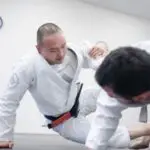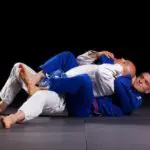You just woke up and you were looking forward to Jiu-Jitsu class later that night, but your throat is getting sore and your nose is starting to run. You begin to wonder if you should train tonight, I mean, you feel good what’s the worst that could happen? We’ve all been sick and we’re all dedicated to our discipline, but it’s better to take the time off to prevent spreading sickness and to recover to come back stronger!
The main reason why you shouldn’t train Jiu-Jitsu when sick is that it can take longer to recover from a minor illness or make the illness worse. Training with others while sick will spread the infection to your teammates, some of which may be professional fighters. Since your immune system is comprised, it can be easier to catch other infections and viruses. It’s important to take the necessary time to recover as you will not lose progression or fall behind missing a few classes.

Disclaimer: It’s important to consult a doctor to get the proper medical advice with any sickness.
Should You Train Jiu-Jitsu When Sick?
Jiu-Jitsu is a close contact activity, which means it’s an easy place to spread infections and viruses. The infections and viruses can be spread from covering your mouth with your hand or Gi, coughing/sneezing on the mat, or having your face smear against everyone else’s body and face. It’s the perfect environment to spread illness to everyone in just one session.
With that said, you should not train while sick. Not only do you risk getting multiple people sick, but you also risk everyone’s families getting sick. Some gyms have professional or amateur fighters, getting them sick can put them behind in the training for a major upcoming fight.
Finally, typically when we are sick it is harder to do activities or tasks that involve concentration or physical demands. Jiu-Jitsu requires both, meaning you’re generally going to have a sub-par training day even if you do go to class. The result is even further exhaustion for your immune system. With that in mind, taking a day or week off will allow the body to recover. Review notes from your class or videos online to make the most of your week off and you’ll come back stronger without spreading your cold or flu around.
Jiu-Jitsu With A Common Cold?
Training Jiu-Jitsu with a common cold is not recommended. You’re going to be training in close quarters with others which means you’re going to spread the cold to them. The common cold usually only takes one week to fully heal so it’s better to take the week off than to spread it to everyone in the class and their families.
Cold viruses spread mainly hand to hand. The cold’s infectious virus is contained in small droplets. The droplets survive on many types of surfaces and can be transferred when a person touches the contaminated surface and then touches their mouth or nose.
Coughing in the gym means you’re spreading infectious droplets onto the mats. If you cover your mouth, it’s getting on your Gi. Since Jiu-Jitsu entails the face rubbing against the mat and the Gi it is very easy to spread a cold to everyone in the gym in just one class.
In simpler terms, if your teammate decides to train while sick and they sneeze and you get sick, that phlegm or snot that came out of them entered your mouth or nose. If you don’t want to be on the receiving end of that don’t be the person that does it to someone else.
When Should You Return To Training?
The right time to return to training is when you’re no longer contagious and your body feels ready to train again. Different infections and viruses’ will have different recovery times. Also, not everyone recovers at the same rate. Ask a doctor when it is safe to return to training or go when you are sure you are no longer sick. Take a week off from training and reassess how you’re feeling at the end of the week.
Common colds should be completely gone in about a week. For colds and flu’s, most individuals become contagious about a day before symptoms develop and remain contagious for about five to seven days. People with a cold will generally resolve their symptoms without medical intervention in about one week.
The flu that develops complications such as bronchitis or sinusitis can last two weeks. In general, the flu can make you feel very tired and beaten up. A fever is a definite sign you’re sick and contagious. It’s recommended you stay home for at least 24 hours after your temperature goes back down on its own. The symptoms of cough and congestion can linger for weeks if not treated.
Are There Risks To Training When Sick?
There are a few risks to training while you’re sick or showing symptoms. It can take longer to recover from a minor sickness or make the sickness worse. Training with others while sick will spread the infection to your teammates. Since your immune system is comprised, it can be easier to catch other infections and viruses.
The biggest risk to training Jiu-Jitsu is is spreading infections to others. Unlike training with weights or practicing a sport alone, going to Jiu-Jitsu class to train involves interacting with others. There may be professional fighters training at your facility, getting them sick affects their training for their career.
When you are sick, more intense or longer workouts are likely to comprise the immune system. This can cause you to remain sick for longer than necessary. Jiu-Jitsu rolling is high intensity and is taxing no the body. Before drilling, the classes are much tamer; however, you are still in very close proximity to others, your running nose may run on their Gi which they use to wipe their face with – and now their sick. Additionally, when the immune system is comprised it is more likely to catch something else.
Will Missing Class Slow Progression?
Missing a class, especially if you are sick, will not slow down your progression. In the long term, missing a class or a week of classes to allow for recovery will not affect your training long term. There are also benefits to taking a week off if you’ve been training hard for a few months to give your body and mind time to recover.
Missing one Jiu-Jitsu class can feel as though you’re going to fall behind and never catch up. The truth is, you’re not going to fall behind and the concepts you’ve missed will be taught again. Furthermore, just ask your instructor and teammates what was taught the week you were gone, they’ll be happy to help!
Relating to other physical disciplines, like strength training, taking a de-load week is a regular occurrence. For example, the 5-3-1 strength training program calls for a de-load week after 3 weeks of training. The de-load week can be workouts for a week that you only use 50% of your typical weights used or taking the entire week off. In strength training, de-load weeks are used to further progression!
The same can be used for Jiu-Jitsu. If you’re used to training Jiu-Jitsu 3+ times a week it can be beneficial to take a week off, or a week off from rolling. Taking a week off now and then can give the body time to recover and your brain to work on problems away from the sport.
The de-load week can prevent over-training and sticking points by giving the central nervous system (CNS), joints, immune system, and muscles a chance to recover. Additionally, it provides mental benefits by allowing you to rest and relax.
Ease Back Into Training
It can be easy to jump right back into training like you were before being getting sick. With a common cold or another minor illness, there is a good chance that you’ll be able to train hard quickly. Flu’s and other sicknesses can take longer to get back into your regular training intensity.
It’s important to know that just because it’s taking longer to get back to the intensity you had before getting sick isn’t because you took time off to recover. Illnesses like the flu can take longer for the body to fully recuperate even though you are no longer contagious. Your lungs just had a battle after all!
Conclusion
It is important to listen to the body and stop training when you’re getting sick or are already sick. Common colds should only last one week. For colds and flu’s, most individuals become contagious about a day before symptoms develop and remain contagious for about five to seven days.
Jiu-Jitsu is a close contact activity which means the spread of infection is high. Infections and viruses can be spread from covering your mouth with your hand or Gi, coughing/sneezing on the mat, or just drilling and rolling with others. Germs and bacteria can live on the mats and even spread to others in the next class.
Missing a class will not slow down your progression. In the long term, missing a class or a week of classes to allow for recovery will not affect your training long term. Review notes from your class or videos online to make the most of your week off. Your teammates and body will thank you!
Sources
Charles Patrick Davis, MD, PhD. (7/15/2019). How Long Is a Cold or Flu Contagious? Retrieved from https://www.medicinenet.com/how_long_is_a_cold_or_flu_contagious/article.htm
Melinda Ratini, DO, MS. (1/02/2020). How Long Is the Flu Contagious? Retrieved from
https://www.webmd.com/cold-and-flu/how-long-flu-contagious

